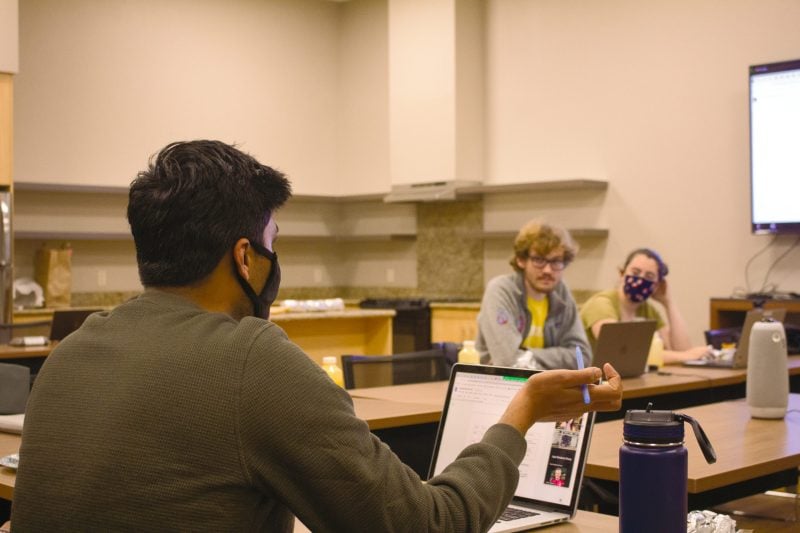The Graduate Student Council (GSC) criticized the Nominations Commission (NomCom), the student-run commission responsible for selecting students to serve on various University committees, for inadequate graduate student representation and maintaining outdated and incomplete records during its Wednesday meeting.
NomCom representatives pushed back in a statement to The Daily, writing that a lack of engagement from graduate students led to their limited representation on committees. They added that NomCom has provided all of the documents requested by the GSC and that the Commission has not maintained incomplete records.
The scrutiny comes during a spree of commission nominations on which the GSC is set to vote next week. Councilors have struggled to overcome issues of underrepresentation of graduate students on University committees, in addition to communication problems between the GSC and nominees. Just last week, the GSC voted against confirming a nominee to the Constitutional Council after repeated failures to make contact with the appointee.
Members of NomCom were not invited to the council meeting on Wednesday, but NomCom representatives wrote that the Commission has “responded to every communication with [the GSC] and been transparent about our process.”
According to GSC councilors, NomCom nominations make a sizable impact on the progress of student advocacy efforts, given that the committees that the nominees join are responsible for engaging in meaningful communication with administrators on behalf of the student body.
Gaining traction with administrators is already difficult enough for graduate student advocates, according to fifth-year modern thought and literature Ph.D. student Jamie Fine.
“The opportunity here that we don’t want to lose is the possibility of these administrators actually having to see the GSC as people,” Fine said. “I’ve spoken to administrators who think that the ASSU is entirely undergraduate and that the GSC is some separate body. They don’t know what we do and they don’t understand why we exist. At least putting forth a little bit more of a presence as graduate students who are engaged on campus might be useful.”
Ensuring that graduate student advocates are represented on University committees through proactive nominations is one way to guarantee that the graduate community has an audience of administrators for its concerns, according to councilors.
But making progress toward that goal proved difficult at Wednesday’s meeting. The NomCom’s list of current committee members included inaccurate information about a student’s area of study and included students who no longer attend Stanford, according to councilors.
And even some of the committee information that is accurate is still concerning to the councilors. According to the NomCom’s records, there are no graduate students currently serving on the Committee on Graduate Studies.
“How do you have a committee about students with no students on the committee?” Fine asked. “It’s ridiculous.”
The commission rejected the notion that its records were incomplete, writing that “the spreadsheet we sent to the GSC per their request showed which students had been appointed to University Committees last school year, and thus did not include all of the graduate students that we have been able to appoint since then.”
The fact that the records were from last year is the reason that there were former Stanford students according to NomCom representatives, who also noted that they were aware of only one typo that misstated a nominee’s area of study.
Part of the representation issue could have to do with outreach, according to GSC co-chair K.C. Shah J.D. ’22. When the GSC advertised open positions through its mailing list, there was a “rush of applications,” Shah said. But targeted outreach can be difficult within a community as large as the graduate student body.
“The commission has done much to engage with the graduate student population and has worked tirelessly to recruit graduate students to University Committees this year,” NomCom representatives wrote. “In the past general application cycle (2021-2022), few graduate students applied for positions on University Committees despite our advertising efforts.”
The representatives responded to the criticisms of the lack of graduate students on graduate committees, noting that “there was a delay in appointing students to the Committee for Graduate Studies, for example, but all of the positions on that committee have now been filled and are now awaiting approval from the Graduate Student Council.”
According to GSC co-chair and fifth-year communications Ph.D. student Sanna Ali, many of the challenges are rooted in struggles with continuity. At Stanford, it takes a while to gain an understanding of how decisions are made and how the University functions, according to Ali, and the constant stream of graduate students entering and leaving the University makes it difficult to achieve long-term progress. The COVID-19 pandemic was no help, Ali said.
“It seems like so much got lost last year,” Ali said. “The discontinuity leaves us with gaps where we don’t know who is on the committees, we don’t know what the committees are. So it’s more of this broader question about where graduate students are able to be represented.”
The Daily has updated this article to include comments from NomCom representatives and to reflect that the “outdated information” in NomCom records was actually information from the 2020-21 committee list which will be updated when the GSC confirms the current nominees. The Daily regrets this error.
